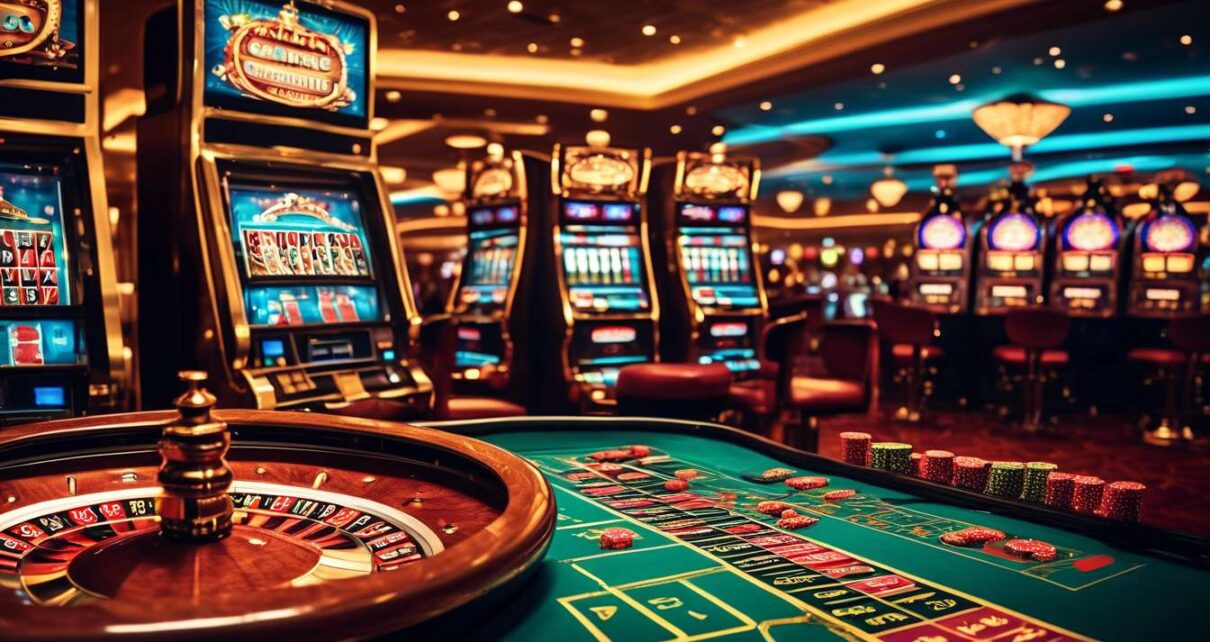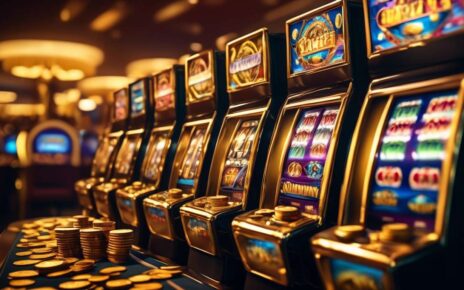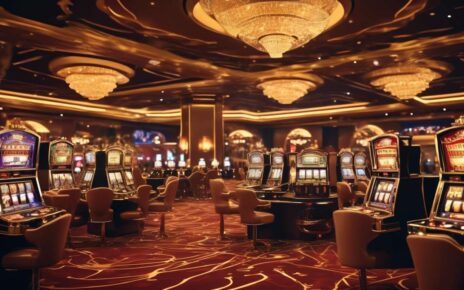We have all heard the captivating tales that swirl around casinos, tales that often blur the lines between myth and reality. Some of us might even have shared these stories ourselves, convinced of their truth. But how many of these beliefs hold up under the scrutiny of scientific investigation?
In this article, we embark on a journey to separate fact from fiction when it comes to casino myths. By examining popular misconceptions and contrasting them with scientific findings, we aim to provide a clearer understanding of how casinos really operate.
Together, we will explore common myths such as:
- The belief that slot machines can be "due" for a win.
- The notion that certain strategies can guarantee success at the roulette table.
Armed with data and expert insights, we intend to demystify the allure of these tales, empowering ourselves with knowledge that transcends the glittering facades of casino lights.
The Myth of Hot and Cold Machines
The Myth of "Hot" and "Cold" Slot Machines
Many people believe in the myth that slot machines can be "hot" or "cold," but this idea doesn’t hold up under scrutiny. Slot machines are governed by probability, not the whims of fate. Each spin is an independent event, unaffected by previous outcomes.
The Psychology of Superstition
As a community that seeks the thrill of possibility, we often fall into the trap of superstition. The psychology behind this belief is fascinating because we crave patterns and meaning, especially in environments designed to tantalize and engage our senses.
When we think a machine is "hot" because it’s paid out recently, or "cold" after a losing streak, we’re succumbing to cognitive biases.
Understanding Cognitive Biases
- These perceptions of streaks make us feel connected to something larger, but they’re illusions.
- Machines don’t have memories or emotions; they operate on random number generators.
Enjoying Gaming Experiences
By understanding the reality of probability, we can better enjoy our gaming experiences without relying on myths to guide us. Let’s focus on the facts and enjoy the camaraderie of shared experiences.
The Truth About Card Counting
Card counting is a controversial strategy that some players use in blackjack to gain an edge over the house. By tracking the cards that have been played, card counters attempt to calculate the probability of favorable cards appearing next. It’s not foolproof, but it’s rooted more in mathematics than myth.
Psychology Behind Card Counting:
- Card counting demands intense concentration and memory.
- These skills can make players feel part of an exclusive group.
Casino Countermeasures:
- Casinos are aware of card counting tactics.
- They have measures in place to counter these strategies.
Conclusion:
While card counting might seem like an alluring strategy, it’s not a guaranteed path to riches.
Let’s embrace the real challenge: enjoying the game itself, where we can share in the excitement without relying on card counting.
Dispelling Lucky Charms Superstitions
Many of us have clung to lucky charms, believing they might tilt the odds in our favor at the casino. It’s comforting to think a special token or routine can influence the outcome.
Yet, when we delve into the science of probability, we find that our reliance on these objects stems more from superstition than reality. The psychology behind this is fascinating—our brains are wired to search for patterns and control, especially in uncertain situations.
We often feel a sense of community when sharing these beliefs, seeing others with their lucky items, and reinforcing our shared hope. However, casinos operate on mathematical principles that don’t bend to personal talismans. Each game is governed by probability, ensuring that the house maintains its edge regardless of our rituals.
By understanding the role of psychology and probability in gambling, we can better navigate the casino floor, focusing on enjoyment and camaraderie over misplaced faith in lucky charms.
Uncovering the Reality Behind Slot Payouts
Many of us are curious about how slot machines determine their payouts, often wondering if there’s any truth to the myths surrounding these popular games. We might hold onto superstitions, believing that certain machines are "hot" or that a specific time of day increases our chances of winning. However, understanding the probability behind slot payouts can help us see through these myths.
Slots operate using a random number generator (RNG), which ensures every spin is independent and random. This means our chances of winning aren’t influenced by previous outcomes.
The psychology behind slot machines is designed to keep us engaged, with bright lights and exciting sounds reinforcing the allure of a potential win. But in reality, probability governs the payouts, not luck or timing.
By recognizing these truths, we can better appreciate slot machines for what they are: games of chance. Together, let’s embrace this shared understanding and enjoy the thrill without falling for myths.
The Science of Casino Comps
Casinos have a strategic system for offering comps to encourage us to play more and enhance our overall experience. By providing free drinks, meals, or even hotel stays, they make us feel valued and part of an exclusive community.
The psychology behind comps taps into our emotions, making us more likely to return and spend. There’s more than meets the eye in this tactic.
Casinos use probability to their advantage:
- We might attribute winning streaks to luck or superstition.
- Casinos know the odds are ultimately in their favor.
- They capitalize on this knowledge by rewarding us just enough to keep us engaged and hopeful.
Understanding the science behind comps can empower us to navigate the casino environment more wisely. By recognizing these tactics, we can enjoy the sense of belonging and excitement without falling prey to the illusion that we’re beating the system.
After all, awareness is our best ally in the world of chance.
Debunking the Martingale Betting System
Many gamblers believe in the Martingale betting system, thinking it guarantees a win by doubling bets after each loss. The appeal is understandable—it feels like a foolproof strategy.
However, when we dig into the probability, we see the cracks. Casinos thrive on our belief in such superstitions. The psychology behind this system is compelling; it gives us a sense of control and hope. We long to feel like part of a winning team, but in reality, the system’s flaws are glaring.
Key Flaws of the Martingale System:
-
Independent Events:
- Each bet remains an independent event, unaffected by previous losses. The odds do not bend to our will.
-
Escalating Bets:
- As losses pile up, our bets quickly escalate, reaching table limits or depleting our bankroll.
-
Financial Strain:
- The system doesn’t account for these limitations, setting us up for potential financial strain.
Let’s not fall into the trap of believing in this illusion. By understanding these pitfalls, we become smarter, more informed gamblers who value genuine knowledge over comforting myths.
Understanding House Edge Fallacies
Many of us misunderstand the house edge, thinking it’s a minor factor when, in reality, it significantly influences our chances of winning. While we might feel a sense of community at the casino, all gathered with hopes high, understanding the house edge is crucial to improving our odds. It’s not just about luck or superstition; it’s about the cold, hard probability that favors the house.
When we gamble, the house edge isn’t just a number—it represents a consistent advantage that casinos hold over us. This edge ensures that, in the long run, the house always wins. We often rely on intuition or tricks, believing we can outsmart the system. However, the psychology behind gambling can cloud our judgment, leading us to overestimate our chances of success.
Let’s remember that the house edge is an inherent part of casino games, designed to keep us coming back. By acknowledging this, we can:
- Make more informed decisions
- Enjoy the experience without false expectations
Understanding the house edge allows us to approach gambling with clarity and realism.
Examining the Psychology of Near Misses
Many of us have experienced the almost-thrill of a near miss, where it feels like just one more spin or card could have led to a win. This phenomenon captivates us, feeding into the psychology of why we keep playing.
Near misses trick our brains into believing we’re on the verge of success, even when probability suggests otherwise. This illusion can lead us to develop superstitions, thinking luck is just around the corner if we keep trying.
In these moments, the anticipation is shared, creating a bond among us as we root for each other to succeed. Casinos understand the allure of near misses and incorporate them into games to encourage continued play.
The psychology behind this is powerful; we feel so close, yet so far, motivating us to persevere.
Recognizing this pattern helps us make informed decisions. Let’s stay aware of how near misses play with our minds, reminding ourselves of the actual odds and probabilities at play.
What role does randomness play in casino games?
Randomness plays a crucial role in casino games. It adds excitement and unpredictability to the outcome, making each game a unique experience.
As players, we appreciate the element of chance that comes with randomness because:
- It levels the playing field
- Keeps things interesting
Without randomness, the games would lose their appeal and strategy, making every win or loss more about skill than luck.
Are professional gamblers more successful than casual players?
Professional Gamblers vs. Casual Players
We believe professional gamblers may have an edge over casual players due to their experience, skills, and strategies.
Key Advantages of Professional Gamblers:
-
Experience and Skills: They often approach games with a more calculated mindset, having honed their abilities through practice.
-
Strategic Approach: While luck still plays a role, professional gamblers use their dedication and discipline to achieve more consistent success.
-
Informed Decision-Making: Their expertise allows them to make informed decisions and manage risks effectively.
Outcome:
These factors can result in better outcomes in the long run for professional gamblers compared to casual players.
How do casinos use data analytics to enhance the gaming experience?
Casinos and Data Analytics
We’ve noticed that casinos are increasingly using data analytics to improve the gaming experience.
Personalized Promotions and Rewards
By analyzing player behavior and preferences, casinos can:
- Tailor promotions
- Customize rewards
- Curate game selections
This personalized approach creates a more engaging and enjoyable environment for us as players.
Adaptation to Player Needs
The use of data analytics shows how casinos are adapting to our needs and preferences, making our overall experience more satisfying and enjoyable.
Conclusion
In conclusion, science debunks common casino myths, shedding light on the reality behind gambling.
Understanding the facts can help you make informed decisions and enjoy the gaming experience responsibly. Remember, luck may play a role, but knowledge and strategy are key in navigating the world of casinos.
Stay informed, stay sharp, and may your future bets be based on facts, not fiction.
Happy gaming!




